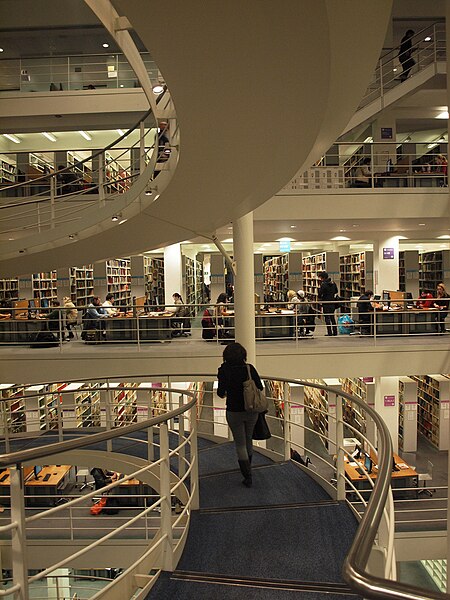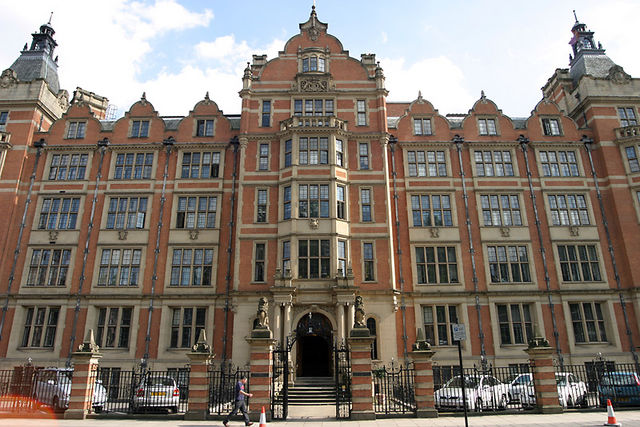
Thammasat University students are cordially invited to participate in a free online public lecture about the history of the London School of Economics and Political Science (LSE).
Political Science at LSE: a history of the Department of Government, from the Webbs to COVID-19 will be held on Thursday, 7 October starting at 9pm Bangkok time.
It is hosted by the LSE Department of Government.
As its website explains, the Latin motto of the university is Rerum cognoscere causas or To know the causes of things.
The Thammasat University Library collection includes many books about , or produced by research from, the LSE.
As TU students know, many Thais have graduated from the LSE and one of the most distinguished alumni is Dr. Puey Ungphakorn.
The Dr. Puey Ungphakorn Centenary Scholarship is awarded annually at the LSE by the Bank of Thailand for one student from Thailand.
In addition, the Ph.D. thesis of Dr. Puey is posted online at the LSE website as an outstanding graduating thesis.
Its title is The Economics of Tin Control and it is available for free download.

LSE has over 11,000 students, with almost seventy percent from over 150 different nations.
LSE has the second highest percentage of international students of all world universities, after the American University of Sharjah in the United Arab Emirates, which has the highest proportion of all ranked universities at 82 per cent foreign enrollment.
LSE teaches much more than just economics, specializing in a range of pure and applied social sciences.
An Open Access book available for free download at this link.
Political Science at the LSE: A History of the Department of Government, from the Webbs to COVID is written and edited by a number of the professors who will speak at the 7 October event.
The publisher’s website explains that the book
traces the emergence and evolution of the LSE Government Department from 1895 to 2020, focusing on the personalities that guided the development of the Department, the social and political contexts the Department existed within, its research agenda and course structure, and the location of the Department in British politics. It also charts the evolution of the discipline of political science in Britain itself. The volume is divided chronologically into four chapters, each covering roughly similar time periods in the Department’s history and focuses on the events that shaped it: personalities, events, and location. Key themes are the development of political science in Britain, the impact of location on the LSE Government Department, the professionalisation of academia in Britain, and the microcosm the Department presents of British political life during each time period. The conflicts between progressive and conservative forces are a recurring theme which helps link the internal dynamics of the Department with the wider social and political contexts that occurred from the beginning of the School to its 125th anniversary.
The volume uses detailed archival research, particularly in the early chapters, as well as over thirty interviews with a range of individuals with unique perspectives on the Department… As a history of the LSE, as well as of the development of British higher education, it serves as both a specific case study and a general representative of wider trends within universities during the twentieth and early twentieth-first centuries. A unique feature of this monograph is that it represents the collective efforts of students from the LSE Government Department (including undergraduate, MSc and PhD), who worked under the leadership of Professor Cheryl Schonhardt-Bailey (Head of Government Department) and Dr Gordon Bannerman (British Historian). This collaboration has enabled a rich array of perspectives on the history of the Department but has also brought the monograph to life with personal ties to the Department itself.

The book’s Introduction notes that recent
efforts to bring the Department more in line with political science in the United States also fuelled a change in the appointments system. The LSE calendar was aligned with the American appointments calendar to attract American applicants, as well as European ones. The Department also aimed to compete globally for staff, and this formed another major incentive for increasing competition in the appointments system, making the process fairer and less elitist in the hope of increasing the number of appointments of women and minorities. Concerns were raised that the new appointments process would not support the appointment of more female and minority candidates, as the sociability element within the process would advantage more privileged and male candidates at the LSE due to their affability. The worry was that the reformed system took the emphasis away from professional ability and more towards likeability. This change was part of a wider process from 2010 onwards to professionalise the Department, aligning it with the international academic hiring process, both to attract the best candidates and to place LSE PhD students at better universities worldwide, but inevitably with great weight placed on North America and Europe. Before the 1990s, the Department had little focus on Europe, and few European students…This shift in concentration towards European expertise allowed the LSE to challenge the tendency to engage mostly with English and American literature, recruiting more academics from across Europe, and enabling the Department to broaden its scope and course offerings. However, the challenges posed by British withdrawal from the European Union places this broader outlook at risk. The School’s 125th anniversary also coincides with another historic event, one which any treatment of the Department cannot properly ignore. The COVID-19 pandemic has brought about changes to both the School and society not seen since the Second World War. A pandemic of this magnitude has been faced only once in the history of the Department, back when it was still a loose collection of scholars led by Graham Wallas: the H1N1 Spanish Influenza pandemic of 1918.
Its Conclusion, in part, describes the impact of the Novel Coronavirus 2019 (COVID-19) on education at LSE:
The pace of the crisis escalated so that by 22 March, the School had significantly scaled back its campus operations to about a dozen (mostly security) staff, thus resembling its typical closure arrangements over the Christmas holiday. This was just the beginning of the disruption to follow for the remainder of 2020. Except for the School moving to Cambridge for six years during the Second World War, never had the School faced such an upheaval. With just weeks of planning, all examinations were given online. Summer School was cancelled entirely, and the School effectively became something of a ghost town over the summer months. Meanwhile, as international travel came to a standstill, academic and professional services staff continued to work throughout the summer in order to plan a ‘return to campus’ and some face-to-face teaching in autumn 2020, alongside the provision of all lectures online. Within the Department, individual members of staff were given ‘risk assessments’ to gauge whether they could ‘safely’ return to deliver face-to-face teaching. Heads of Department and Department Managers were faced with the daunting and uncomfortable task of assessing whether the pre-existing vulnerabilities of colleagues (health, age, home environment) posed a significant enough risk to warrant moving all their teaching online. Overall, the pandemic found its way into almost every aspect of the home and work lives of staff. Perhaps one day a full history will be written on the impact of COVID-19 on the LSE.

(All images courtesy of Wikimedia Commons)
